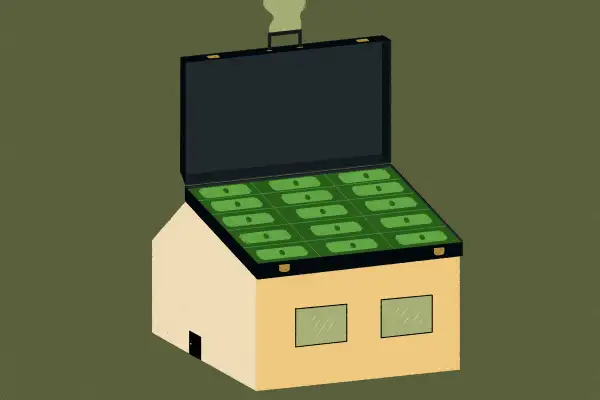Buying a House in Cash Can Save You Thousands, and You Don't Have to Be Rich to Pull It Off

When Shermika Bennett entered a bidding war on her dream home last month, she didn’t expect to win out — especially at $25,000 less than other bidders. But win she did, and now, Bennett and her family are the proud owners of a six-bedroom, three-fireplace home in the heart of Atlanta.
“I was surprised and astonished when I was told my bid was chosen,” says Bennett. “I definitely didn’t think that a lower bid would win. Everyone always goes with the highest offer.”
The secret to Bennett’s great deal? Her offer didn’t hinge on mortgage financing. With the help of an emerging new homebuying solution, Bennett was able to make a cash offer. And cash offers, well, they usually mean big savings.
According to a new study from researchers at the University of California-San Diego, stories like Bennett’s aren’t that uncommon. Over the past 40 years, cash buyers have paid about 12% less than those using a mortgage. That’s the difference between a $200,000 price tag and a $176,000 one.
The reasons for the discount are many, but the primary driver is the certainty that cash provides sellers. On mortgaged offers, there’s always a chance the deal falls through — either due to the appraisal, an inspection issue or the buyer failing to qualify for the loan itself.
“Many sellers are willing to accept a lesser offer in exchange for certainty that the deal will close,” says Kristina Morales, a realtor in Cleveland. “With a cash offer, there is no financing contingency and, more often than not, no appraisal contingency. Without these contingencies, sellers have more confidence that the deal will close.”
It seems sellers may be warier than is warranted, though. According to the National Association of Realtors, only about 6% of all contracts end up failing — and financing problems represent just a small portion of those.
“Sellers leave a lot of money on the table,” says Michael Reher, one of the report’s authors and an assistant professor of finance at UCSD. “They’re more worried about financing falling through than they need to be.”
Why do sellers prefer cash?
Whether the data supports it or not, experts say sellers are indeed fearful of mortgage issues, and that fear plays a big role in why buyers like Bennett win out.
When financing falls through, sellers are forced back to square one — often setting their sale back weeks or even months. This can be especially challenging if they’re trying to purchase a new home at the same time.
It also hurts the home’s marketability, potentially delaying the sale even longer.
“If that happens, they’ll have to re-list their home on the market, which could greatly reduce the amount they can get for the home,” says Vanessa Famulener, vice president of HomeLight’s Cash Close program. “A home that’s gone back on the market is like damaged goods.”
But that’s not the only appeal cash offers hold for sellers. According to Shaival Shah, CEO and co-founder at cash-offer solution Ribbon, cash-offers are faster, too. With cash offers, closings can take as little as 14 days. A typical mortgage closing takes anywhere from 30 to 60 days in most cases.
This speed, plus the added certainty these offers bring, can often give cash buyers the upper hand in bidding wars — a common occurrence in today’s short-on-supply market. According to real estate brokerage Redfin, about 56% of its offers were met with a bidding war in January.
“My teams like to say that cash is king,” explains Keli James, a Realtor at eXp Realty in Las Vegas. “Cash offers will usually make your offer the strongest on the table and give you a higher chance of walking away with the keys to your new home.”
Even more savings for buyers
As if 12% off the top and an edge in bidding wars weren’t enough, cash offers come with additional savings, too. These stem from all sorts of mortgage-related costs — the largest being interest.
If you were to finance a $200,000 home today (using a 30-year, fixed-rate mortgage loan at Freddie Mac’s current average rate of 3.02%), you’d end up spending a whopping $104,332 in interest over the next three decades. With a cash offer? You’d have no interest costs whatsoever.
Cash buyers also avoid certain closing costs — which usually total 2% to 5% of the loan amount — as well as mortgage insurance, which can range from $30 to $70 per month on a conventional loan.
“Cash offers don’t have to deal with the fees involved in working with a bank, including appraisal fees, processing fees, mortgage interest over time and more,” notes Tony Rodriguez-Tellaheche, co-founder of Prestige Realty Group in Miami. “Depending on the property, this could amount to tens of thousands of dollars in savings.”
To be fair, a cash offer doesn’t remove all closing costs entirely. According to Paul Buege, president of Inlanta Mortgage in Menomonee Falls, Wisc., cash buyers will still need to cover things like title insurance and recording fees to transfer the home’s title. These fees vary by location, but you can usually expect to pay between $1,000 and $2,000.
No cash? No problem
Cash offers likely sound a bit intimidating to most buyers — especially with the average home price sitting at nearly $304,000. But thanks to a few creative solutions, you actually don’t need a flush bank account or tons of savings to get many of the benefits.
Programs like Ribbon, HomeLight’s Cash Close and Opendoor’s Cash-backed Offers — which Bennett used to save $25,000 — are just a few of the options that let you make cash offers without footing the bill yourself.
With these programs, the company makes a cash offer on your behalf, and you actually mortgage the property in a separate transaction without involving the seller. This allows you to leverage those all-cash pricing discounts, stand out from other buyers and potentially win a bidding war — all without dipping into that emergency fund or drawing from your savings. (Though, of course, you still end up paying closing costs and interest payments associated with your eventual loan.)
As Famulener puts it, “It’s the best of both worlds — especially in a competitive market where cash is king to sellers.”
According to Tom Willerer, chief product officer at Opendoor, buyers who use his company’s cash offer program see their bids win 50% more often than those with traditional mortgaged offers. Bennett is just one such example.
"For buyers right now, the real advantage of making an all-cash offer is having a leg up on other interested parties when competing for the home,” Willerer says. “With low interest rates, limited inventory and high demand, buyers need to find ways to make their offer as appealing to the seller as they can. In this case, the cash component made it that much stronger, and our buyer won the home.”
The downside of paying cash
Despite its perks, all-cash buying has some drawbacks. Most notably, it ties up your money.
Real estate is what’s called non-liquid. It can help you build wealth, but it’s not as easy to access that money as with other investments — like stocks or money market accounts. If you find yourself in a financial bind down the line, this could cause a problem — especially if you’ve put all your savings into the home.
Paying all cash also takes money away from other potential investments — ones that may equal higher returns in the long run.
“With interest rates currently so low, borrowers may be able to earn better interest yields by investing their cash instead of putting it all towards their home purchase,” Buege says. “Yes, homeowners with a mortgage will have to pay interest on the money owed, but if they can earn a higher rate of return by investing the funds, it might be in their best financial interest to take out a mortgage.”
Still, there’s something to be said about life without a mortgage. Take Rick Patterson, for example. Patterson bought his Tulsa, Okla. home using all cash in December 2019, and now, he saya, he has “virtually no debts of any kind and minimal bills to pay each month.”
As he puts it, “The real benefit is peace of mind and a stress-free lifestyle. I will always have a home no matter what happens.”
More from Money:
Thinking of Tapping Your 401(k) for a Down Payment on a House? Read This First
Low Rates Are Putting 15-Year Mortgages — and Big Savings — Within Reach for Millions of Homeowners
